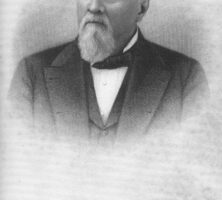Charles Jones Jenkins, most noted for his defiance of military authority while governor of Reconstruction Georgia from 1865 to 1868, was also a prominent political figure in the Whig Party during the antebellum period and a justice of the state supreme court during the Civil War (1861-65). Jenkins County, in east central Georgia, is named in his honor.
Jenkins was born in Beaufort, South Carolina, on January 6, 1805. The family moved to Georgia in 1816. After two years at Franklin College (later the University of Georgia), he graduated from Union College in Schenectady, New York, in 1824.
Early Career
Jenkins read law and in 1826 opened his first practice in Sandersville, and then another in Augusta three years later. He launched his political career in 1830 with his election to the state legislature as a States’ Rights Democrat. Later he was a Whig. From 1831 to 1834 he served simultaneously as solicitor general of the Middle Judicial Circuit and as state attorney general. He also served intermittently in the assembly until 1850 and was Speaker of the House during the four terms that the Whigs held a majority.

Courtesy of Georgia Capitol Museum, University of Georgia Libraries
Following the passage of the Compromise of 1850, Georgia moderates formed the Constitutional Union party. At a state convention that year, Jenkins drafted the so-called Georgia Platform, which declared southern cooperation with the federal government on issues related to the extension of slavery, in return for no northern violations of the compromise. In the presidential election of 1852, a breakaway faction of Whigs nominated Daniel Webster as their presidential candidate and Jenkins as vice president. They polled only a few thousand votes.
Jenkins drifted through the 1850s, politically speaking. He was invited to be a cabinet officer in the administration of U.S. president Millard Fillmore but declined, ran unsuccessfully for governor in 1853, and held a state senate seat beginning in 1856. With the demise of the Whigs, Jenkins refused to align himself with either Democrats or Know-Nothings. In 1860 Governor Joseph E. Brown appointed him a judge of the state supreme court, and Jenkins retained that position until the end of the Civil War.
In December 1860 Jenkins ran as a candidate of the “cooperationists” to the Georgia secession convention. The cooperationists preferred that Georgia not act alone but make its secession decision in concert with other southern states. In balloting in Richmond County, Jenkins and his colleagues lost out to more radical candidates. Jenkins personally believed in the right of secession but thought some overt act of aggression by the Republican administration in Washington, D.C., was required as provocation. This was the same position he had taken in his Georgia Platform. However, when the ordinance of secession was adopted in January 1861, he wholeheartedly supported it.
Reconstruction Governor
After the Civil War, Jenkins was a leader in the convention that drafted a new state constitution, and he was elected governor in November 1865. The state was bankrupt and deeply in debt. Jenkins restored Georgia’s credit and financial condition within two years. He advised the legislature not to ratify the Fourteenth Amendment to the U.S. Constitution, which guaranteed rights to freedpeople, and tried unsuccessfully to persuade the U.S. Supreme Court to issue an injunction against the federal Reconstruction Act of 1867. When General George G. Meade, the military commander in Georgia, directed that the state pay $40,000 for another constitutional convention that recognized the federal requirements, Jenkins and state treasurer John Jones refused. Meade removed them from office in January 1868 and replaced Jenkins with General Thomas Ruger.

Courtesy of Hargrett Rare Book and Manuscript Library, University of Georgia Libraries.
Jenkins left Georgia, taking with him his official documents and the seal of the governor’s office, while Jones took $400,000 in state money to deposit in a bank in New York. The ex-governor appealed to the U.S. Supreme Court, but the court refused to take jurisdiction. Jenkins lived abroad for two years and in 1870 returned to Augusta. When a Democratic governor and assembly were elected in 1872, Jenkins returned the sequestered items to his “first legitimate successor.” In response he was presented a facsimile of the governor’s seal with the motto In Arduis Fidelis (Steadfast in Adversity).
In the presidential election of 1872, Jenkins received two unsolicited Democratic electoral votes. He served as president of yet another constitutional convention in 1877 but otherwise retired from public life. He died in Augusta on June 14, 1883, and was buried there in Summerville Cemetery with his two wives, Sarah Seaborn Jones and Emily Gertrude Barnes, and the three children from his first marriage.








